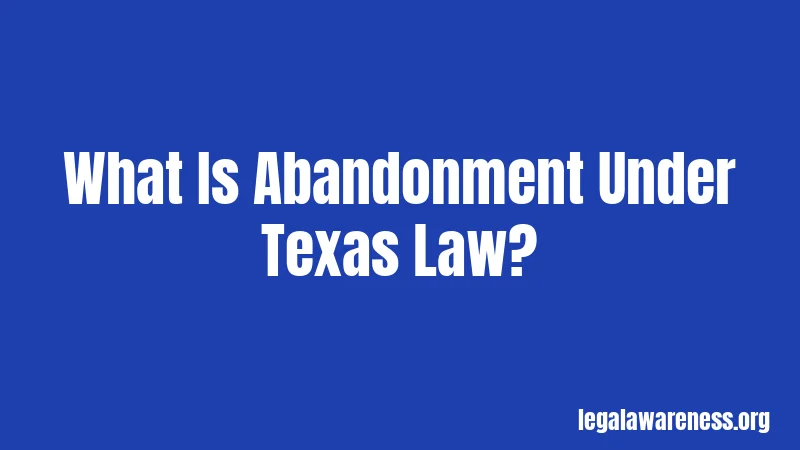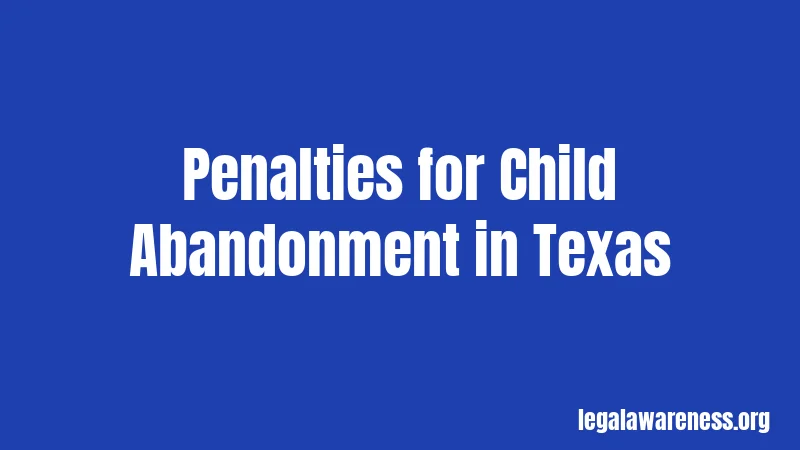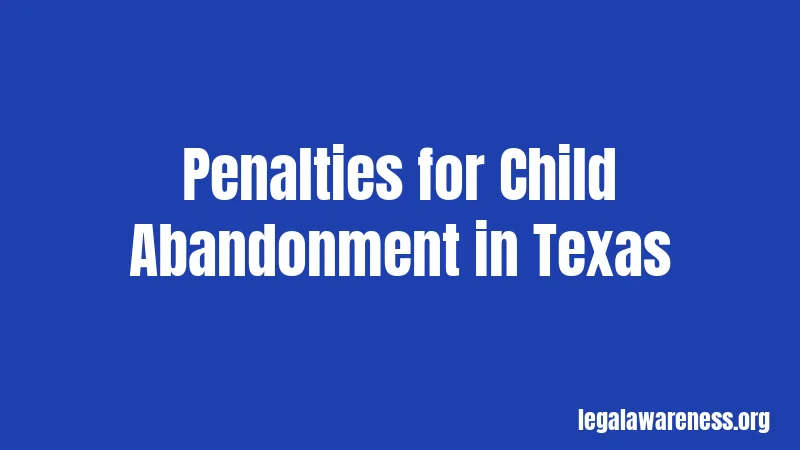Abandonment Laws in Texas (2026): Penalties, Rights, and Safe Options
Most people don’t realize how many different situations fall under “abandonment” in Texas. Seriously. It’s not just about walking away from a child. Texas has separate laws for child abandonment, spousal abandonment in divorce, and even safe ways to surrender a newborn.
Here’s the deal. Understanding these laws matters whether you’re a parent, a spouse, or someone trying to protect a child. Let’s break down exactly what Texas law says and what could happen if these rules are broken.
What Is Abandonment Under Texas Law?


Abandonment in Texas isn’t one single law. It’s actually several different legal concepts depending on the situation. The word shows up in criminal law, family law, and divorce law.
For children, abandonment means leaving a child under 15 without proper care in a dangerous situation. For divorce, abandonment means a spouse left the marriage with no intent to return. And for parental rights, abandonment means failing to support or contact your child for months at a time. Each type has its own rules, penalties, and consequences.
Child Abandonment: The Criminal Law Side
Wondering what counts as criminal child abandonment? Texas Penal Code Section 22.041 spells it out clearly.
You abandon a child when you leave them somewhere without reasonable care. The law asks one simple question. Would another adult in your situation leave a child that age in that place? If the answer is no, you could face criminal charges.
Here’s an example. Leaving a three-year-old home alone while you go to work? That’s abandonment. Leaving your teenager home for a few hours? Probably fine. The child’s age and ability matter a lot in these cases.
The law also covers elderly individuals and people with disabilities. So the same rules apply if you’re responsible for someone over 65 or someone who can’t care for themselves.
What Actions Count as Abandonment?
Texas courts look at several factors when deciding if abandonment happened.
Leaving a young child alone without supervision is the most obvious example. Dropping a child off with someone and disappearing counts too. Failing to provide food, shelter, or medical care when you’re responsible for the child could also qualify. The key is whether you put the child at unreasonable risk of harm.
Pause. This part is important.
Texas also considers it abandonment when you expose a child to dangerous substances. If methamphetamine or other Penalty Group 1 drugs are found in a child’s system, the law presumes you endangered that child.
Penalties for Child Abandonment in Texas


Let’s talk about what happens if you’re convicted. The penalties are no joke.
State Jail Felony (Intent to Return)
If you abandoned the child but planned to come back, you face a state jail felony. That means 180 days to 2 years in a state jail facility. You could also pay fines up to $10,000. This is the lightest punishment for abandonment charges.
Third-Degree Felony (No Intent to Return)
Left a child with no plans to ever return? That’s more serious. A third-degree felony carries 2 to 10 years in prison. Fines can still reach $10,000. The lack of intent to return makes this charge much worse.
Second-Degree Felony (Imminent Danger)
This is the most serious abandonment charge. If you left a child in a situation where death or serious injury could happen, you’re looking at a second-degree felony. That’s 2 to 20 years in prison plus fines up to $10,000.
Pretty serious consequences, right?
The Safe Haven Law: A Legal Way to Surrender a Baby
Hold on. There’s one major exception to child abandonment laws.
Texas has what’s called the Safe Haven Law, also known as the Baby Moses Law. It allows parents to safely surrender newborns without facing criminal charges. This law has saved lives since Texas first passed it in 1999.
How the Safe Haven Law Works
You can bring an unharmed baby who is 60 days old or younger to a designated safe place. These locations include hospitals, fire stations, and EMS stations across Texas. You hand the baby to an employee and tell them you’re surrendering the child under Safe Haven.
That’s it. No questions asked about why you’re giving up the baby.
The employee might ask about medical history to help care for the child. But you don’t have to answer. You can remain anonymous if you choose. As long as the baby shows no signs of abuse or neglect, you won’t be arrested or prosecuted.
Safe Haven Baby Boxes
Some Texas cities now have Safe Haven Baby Boxes. These are climate-controlled compartments built into fire stations or hospitals. You open the door, place the baby inside, and leave. An alarm immediately alerts staff to retrieve the infant.
San Antonio, Abilene, Lubbock, and The Woodlands area have installed these boxes. More communities are adding them each year. This option provides complete anonymity for parents in crisis.
What Happens to Surrendered Babies?
After surrender, the baby goes to Child Protective Services. CPS will not try hard to find the parents. The child becomes available for adoption through the state system.
Can you change your mind? Technically yes, but you’d need to contact the court handling the case before parental rights are terminated. There’s no set timeline for this, so acting quickly matters.
Spousal Abandonment and Divorce


Now let’s shift to a completely different type of abandonment. This one involves marriage.
Texas recognizes abandonment as a fault-based ground for divorce. That means you can file for divorce specifically because your spouse abandoned you. This could affect property division and possibly spousal support.
What Qualifies as Spousal Abandonment?
Texas Family Code Section 6.005 sets the requirements. Your spouse must have left with the intention of abandoning you. They must have stayed away for at least one continuous year.
Here’s something people get wrong. If your spouse came back even briefly, the one-year clock starts over. Those occasional holiday visits? They reset the timeline. The absence must be completely uninterrupted.
Also, if you asked your spouse to leave or agreed to a separation, that’s not abandonment. The leaving must be voluntary and against your wishes.
How Abandonment Affects Your Divorce
Filing for divorce based on abandonment takes more effort than a no-fault divorce. You have to prove your spouse intended to leave permanently. You need evidence of the one-year absence. You must show you didn’t agree to the separation.
So why bother? A few reasons.
Texas judges have discretion in dividing marital property. Proving abandonment as marital misconduct could lead to a more favorable property split for you. You might receive a larger share of assets or less responsibility for debts. Some judges also consider abandonment when awarding spousal maintenance.
When Your Spouse Can’t Be Found
What if your spouse disappeared completely? You still need to serve them divorce papers. Without service of process, the court won’t proceed.
You can ask the court for alternative service methods. Service by publication lets you post notice in a local newspaper. If your spouse doesn’t respond within 30 days, you can proceed with a default divorce. The court then decides property division and custody without their input.
Abandonment and Termination of Parental Rights
Here’s where things get complicated. Let me break it down.
Abandonment can also lead to permanently ending someone’s parental rights. This is different from criminal charges. It’s a family court matter that forever ends the legal parent-child relationship.
Grounds for Termination Based on Abandonment
Texas Family Code Section 161.001 lists several abandonment-related reasons for termination.
If a parent voluntarily leaves a child with someone else for at least six consecutive months without providing adequate support, termination is possible. The six-month period must be continuous. Sporadic contact or support during this time might reset the clock.
A shorter three-month period applies when the parent clearly expressed intent not to return. That intent to permanently give up parental duties matters a lot to courts.
There’s also something called constructive abandonment. This applies when a child has been in foster care for at least six months. If CPS made reasonable efforts to reunite the family but the parent didn’t maintain significant contact or show ability to provide a safe home, rights can be terminated.
What Evidence Do You Need?
Courts require clear and convincing evidence for termination. That’s a higher standard than most civil cases.
You’d need to show the parent was absent for the required time period. Proof they didn’t provide financial support during that absence helps. Evidence of no communication, missed visitation, and no involvement in the child’s life strengthens the case. Witness testimony from family, neighbors, or others can also support claims of abandonment.
The Best Interest Standard
Even with clear abandonment, courts must still find termination is in the child’s best interest. Judges consider factors like the child’s emotional and physical needs, the parent’s ability to meet those needs, and the stability each arrangement provides.
Termination is permanent. Courts don’t take it lightly.
How to Report Child Abandonment or Neglect
If you suspect a child has been abandoned or neglected, Texas law actually requires you to report it. Failing to report is itself a crime.
Contact Information
Call the Texas Abuse Hotline at 1-800-252-5400. This line operates 24 hours a day, 7 days a week. You can also report online at TxAbuseHotline.org, though online reports shouldn’t be used for emergencies.
If a child faces immediate danger, call 911 first.
What to Expect When Reporting
As of September 2023, you must provide your name and phone number to make a report to DFPS. Anonymous reports are no longer accepted by the agency. However, your identity stays confidential by law. Only a court can order disclosure of who made the report.
Professionals like teachers, doctors, and childcare workers face stricter requirements. They must report within 24 hours of suspecting abuse or neglect. They cannot delegate this duty to anyone else.
After You Report
Child Protective Services investigates reports based on priority level. Priority 1 reports involve immediate danger and get contact within 24 hours. Priority 2 reports require contact within 72 hours.
CPS also notifies law enforcement. Criminal investigations may run alongside the CPS investigation.
Impact on Child Custody and Support
Abandonment doesn’t just bring potential criminal charges. It reshapes family relationships legally.
When one parent abandons a child, the other parent often seeks sole managing conservatorship. That’s essentially full custody with decision-making authority. Courts generally favor this arrangement when one parent has disappeared from the child’s life.
What about child support? This one surprises people.
Even after parental rights are terminated, back child support may still be owed. The parent’s obligation to pay what they already owed doesn’t disappear. However, future support payments typically end after termination.
Special Circumstances to Know About
Texas law includes some exceptions and special situations worth mentioning.
Athletic Activities
Believe it or not, there’s a defense for child endangerment related to sports. If your child participates in an organized athletic event with appropriate safety equipment and procedures, that’s not endangerment. Letting your kid play football isn’t a crime.
Financial Hardship
Parents sometimes face impossible choices when money runs short. Texas law recognizes this to some degree. Criminal charges focus on intentional abandonment, not circumstances caused purely by financial inability. However, this defense has limits. If help was offered and refused, financial hardship might not protect you.
Incarceration
Being in jail doesn’t automatically count as intentional abandonment. Courts look at the full picture. Did the parent try to maintain contact while incarcerated? Did they arrange for the child’s care? Imprisonment is just one factor among many.
Frequently Asked Questions
How long does a parent have to be absent to lose rights in Texas?
Generally six months of absence without support or communication can lead to termination of parental rights. If the parent expressed intent not to return, the period can be as short as three months.
Is child abandonment a felony in Texas?
Yes. Depending on circumstances, it ranges from a state jail felony to a second-degree felony. Penalties include prison time and fines up to $10,000.
Can I surrender my newborn without getting arrested?
Yes, under the Safe Haven Law. The baby must be 60 days old or younger and show no signs of abuse. Bring the infant to a hospital, fire station, or EMS station.
How do I prove spousal abandonment for divorce?
You need evidence your spouse left voluntarily with intent not to return, stayed away for one continuous year, and that you didn’t agree to the separation. Documentation, witnesses, and financial records help.
What’s the difference between abandonment and neglect?
Abandonment means leaving a child without care in an unsafe situation. Neglect involves failing to provide basic needs like food, shelter, or medical care while still present. Both are criminal offenses in Texas.
Final Thoughts
Abandonment laws in Texas cover more ground than most people realize. From criminal penalties for leaving children in danger to divorce rights when a spouse disappears, these laws protect vulnerable people in different ways.
The Safe Haven Law offers a lifeline for parents in crisis. Knowing your rights matters if you’re dealing with an absent co-parent. And understanding reporting requirements could help you protect a child in danger.
When in doubt about any of these situations, talking to a family law attorney is your best move. These cases get complicated fast, and the stakes are high for everyone involved.
References
- Texas Penal Code Section 22.041 – Abandoning or Endangering a Child: https://statutes.capitol.texas.gov/Docs/PE/htm/PE.22.htm#22.041
- Texas Family Code Section 161.001 – Termination of Parental Rights: https://statutes.capitol.texas.gov/Docs/FA/htm/FA.161.HTM
- Texas Family Code Section 6.005 – Abandonment (Divorce): https://law.justia.com/codes/texas/family-code/title-1/subtitle-c/chapter-6/subchapter-a/section-6-005/
- Texas Department of Family and Protective Services – Safe Haven Law: https://www.dfps.texas.gov/child_protection/child_safety/resources/baby_moses.asp
- Texas DFPS – How to Report Child Abuse: https://www.dfps.texas.gov/child_protection/child_safety/report_abuse.asp
